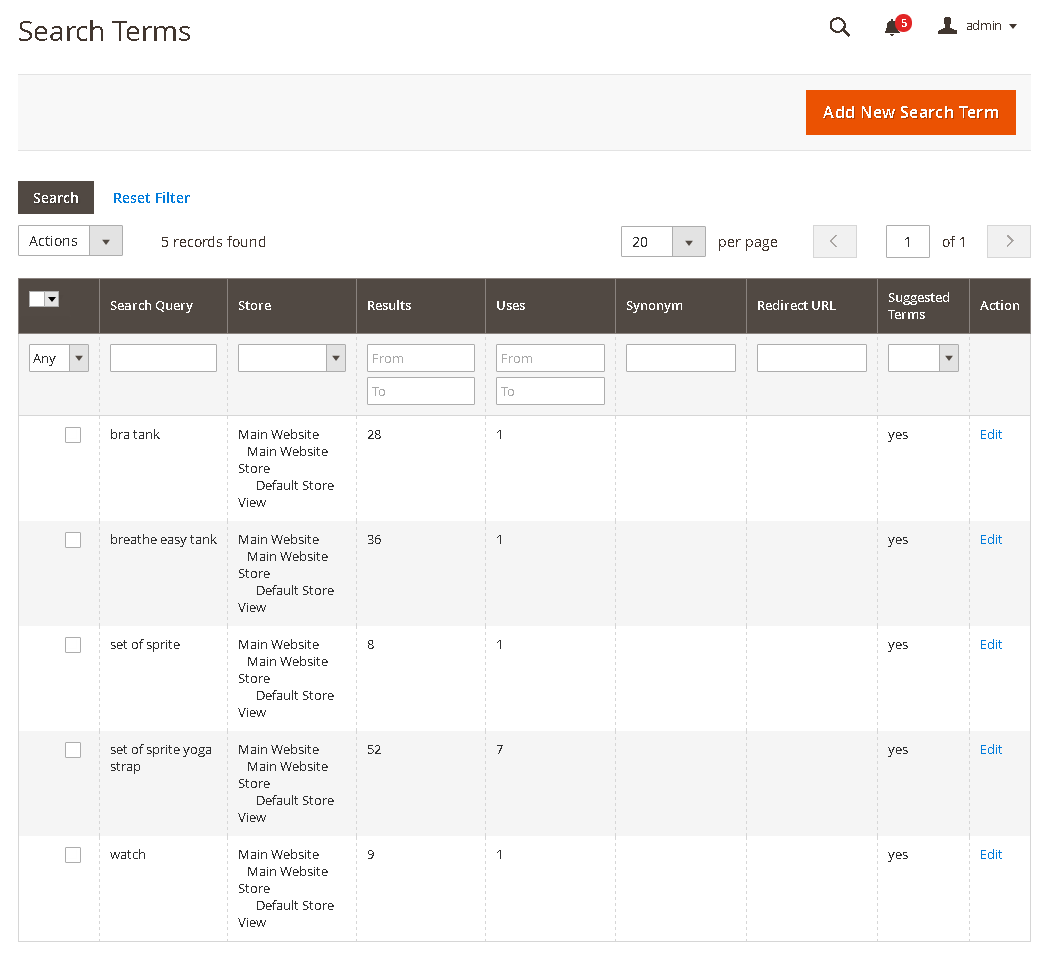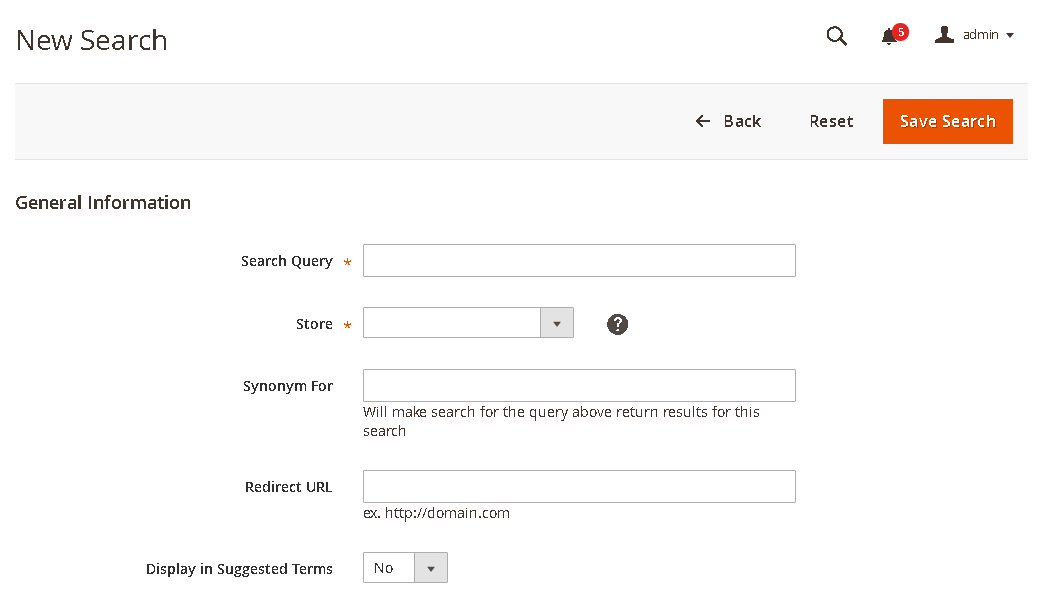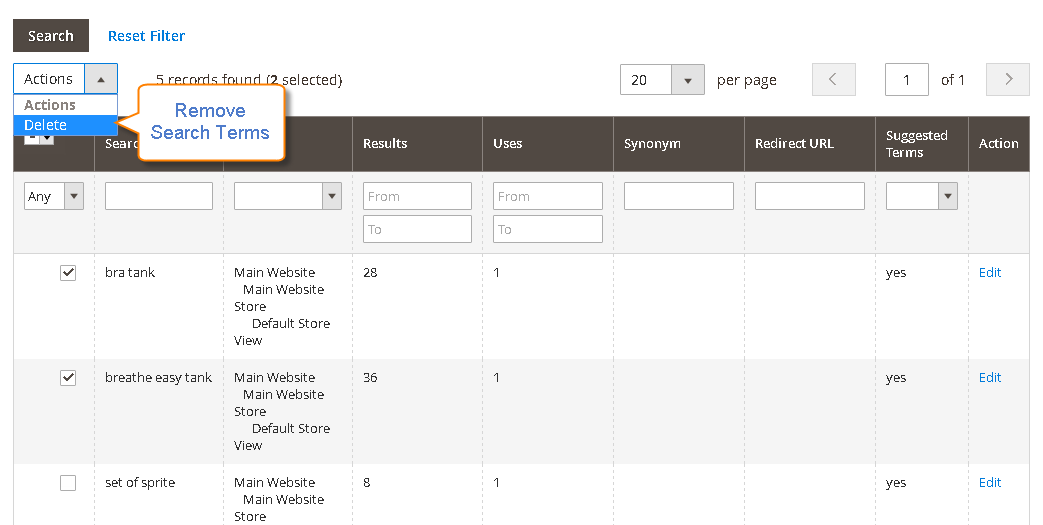How to Add Search Terms in Magento 2
Vinh Jacker | 06-17-2016

Adding more search terms is necessary to make it easy for customers to find any item. With constant research and updates, you can identify their search trends and add keywords accordingly. This can improve customers’ experience and may shorten the search process. Moreover, it is also possible for stores to use search terms and search results as a way to promote current products.
In this tutorial, feel comfortable applying new words and modifying or removing search terms in the catalog. If you want to learn how to configure the Search Terms, follow our previous topic and track the Search Terms Report in the next one.

7 Types of Magento 2 Search Terms
Magento 2 provides different types of search terms to help store owners manage and optimize the search experience for customers. Here are the main types:
1, Product names
Customers often search for specific product names when they know exactly what they want. This way is common for popular or newly released products.
Example: Samsung Galaxy S23, iPhone 14 Pro Max
2, Brand Names
Loyalty to a brand heavily influences buying decisions. Consumers often look for products from their preferred brands.
Example: Dior, Apple
3, Product Categories
Some customers prefer to browse by category rather than searching for specific items. These search terms help users explore multiple product options within a category.
Example: Electronics, home decor
4, Attributes
To narrow choices, customers often add product attributes to their Magento search terms. These attributes include:
- Size: Large sofa, small t-shirt
- Color: Red sneakers, black leather bag
- Material: Cotton bedsheets, stainless steel watch
5, Intent-Based Searches
Some customers include intent-related keywords in their searches, indicating what they are looking for beyond just the product name.
Example:
- Smartphones on sale
- New arrivals in fashion
- Laptops with free shipping
6, Search Synonyms and Variations
Customers might use different search terms and synonyms for the same product or category. To ensure customers find what they need, store owners should accommodate these variations.
Example:
- Sneakers vs. Running shoes
- Sofa vs. Couch
- Backpack vs. Rucksack
7, Descriptors
Customers often use descriptive terms to refine their searches based on product quality, price, or sustainability. These terms help them find products that match their preferences.
Example:
- Organic skincare products
- Affordable smartphones
- Eco-friendly home decor
- Vintage leather bags
Importance of Magento 2 Search Terms
Below are the key reasons why Magento 2 search terms are essential:
-
Improve user experience: A well-optimized search system helps customers find products quickly. When shoppers can easily locate what they’re looking for, they will stay on the site, browse more products, and complete purchases.
-
Boost conversion rates: Higher conversion rates occur when users can easily locate what they want. Optimizing search terms pages ensures they are indexed and appear in search results, improving product indexing.
-
Insight into customer behavior: Magento 2 provides detailed reports on search terms, giving businesses valuable insights into customer behavior, interest, and trends. From analyzing search data, businesses can refine product offerings, and marketing strategies to better meet customer expectations.
-
Personalization opportunities: Using common search terms, Magento store owners can personalize the shopping experience. By tracking search history and preferences, they can suggest relevant products, promotions, and special offers.
-
Reduce bounce rates: Customers will leave the website if they struggle with searches. Optimize search terms to reduce bounce rates and increase conversions.
-
Create competitive advantage: Magento stores with robust search features gain a competitive edge by helping customers find products quickly, boosting engagement, loyalty, and revenue.
How to Add Search Terms in Magento 2
- On the Admin Panel,
Marketing > SEO & Search > Search Terms. - Click on
Add New Search Termbutton, and set the General Information:- In the
Search Queryfield, enter the words for the new search term. - Choose the store view from the dropdown list in the
Storefield if you support multiple stores. - Provide the
Synonym Forfield if the term is a synonym for another search term. You can fill in other terms, and any search for the synonym is automatically navigated to the page of that search term. - In the
Redirect URLfield, insert the URL of the needed page to redirect the search results to that page. - Make this search term available as a suggestion for any search with no results, choose Yes in the
Display in Suggested Termsfield.
- In the
Save Searchto complete.

Method 2: Using Ajax Search extension from Mageplaza
Method 1: Using the admin panel
In addition to the Search Terms, I have a search tool for your inquiry, Magento 2 Advanced Search from Mageplaza that certainly helps improve the search engine ranking better and better.
- Supports Autocomplete search to give proper suggestions to customers
- Enables Instant search with AJAX technology to display results in search boxes when customers type in a letter
- Supports up to 10,000 SKUs for large stores
- Flexible configuration (show/hide price or image of products in the result)
- Allows setting up maximum search results
- Supports all languages to suit multinational operating stores
Modify a Search Term information
- From the management grid including all existing search term, click the row of the needed term to open the edit mode.
- Make any changes to the search term as needed.
Save Searchto complete.
Remove the Search Term in Magento 2
- On the management grid of the search term, tick the checkbox of the term you want to remove.
- On the
Actionbox, choose the Delete option. - Click on
Submitto complete.

Read more about Search settings in Magento 2
FAQs
Can I redirect search terms to specific URLs in Magento 2?
Yes, you can set up redirects for search terms to direct customers to specific product pages or other relevant pages.
How does the catalog search process work in Magento 2? The catalog search process in Magento 2 is created to deliver fast and relevant search results by utilizing indexed product data. When a user types a search query, Magento scans its indexed data to retrieve relevant product information. Then, it will display the results to the user.
How do I handle misspelled search terms in Magento 2?
You can handle misspellings by adding common misspellings as synonyms or using search term redirects to guide users to the correct results.
How can I track the performance of search terms in Magento 2?
You can track the performance of search terms by analyzing search query reports in the admin panel.
How can I optimize their search function to encourage customer usage?
To get more customers to use the search function, you need to make it user-friendly and highlight its benefits. This strategy involves placing the search bar prominently in the header or footer and educating customers about the advanced search functionalities available in Magento 2.
The bottom line
Search Terms play an essential part in customers’ searching process, as they can give shoppers useful information or motivate them to discover more. That is why stores like you have to add new search terms to satisfy their needs and actively promote your products. In addition, by using Mageplaza Search extension, you can do more than just search term addition.
Read more: How to Configure Popular Search Terms in Magento 2










